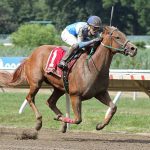Grayson-Jockey Club Foundation announces funding
The Jockey Club today issued the following press release:
The board of directors of Grayson-Jockey Club Research Foundation announced that it has authorized expenditure of $2,455,164 to fund 11 new projects and 13 continuing projects at 14 universities as well as three career development awards. The 2024 slate of research brings Grayson’s totals since 1940 has provided more than $42.3 million to underwrite more than 437 projects at 47 universities.
“Once again, this year’s projects affect all types of horses in every stage of development demonstrating Grayson’s commitment to all breeds and disciplines,” said Jamie Haydon, president of Grayson. “I am especially pleased that we were able to offer a special career development award this year in honor of Nancy Kelly, who was Grayson’s vice president of development for many years and was an advocate for nurturing young researchers.”
Below is an alphabetical list by school of the new projects:
Diet Nonstructural Carbohydrates Alter Ovarian Functions
Elaine Carnevale, Colorado State University
Feeding nonstructural carbohydrates (grains and sugars) to older mares can alter cell function and metabolism in ovarian follicles, impairing ovulation, oocyte and embryo viability, and fertility.
Equine Tendinopathy: Advanced Imaging and Tenex Efficacy
Brad Nelson, Colorado State University
This study will enhance our knowledge of equine tendon repair by comprehensive clinical imaging, while simultaneously assessing a novel tendon therapy, improving veterinary and industry understanding.
Shining A Light On The Black Box Of Early Pregnancy Loss
Amanda de Mestre, Cornell University
This study will determine how common genetic disorders of the early equine embryo occur as well as identify how they present to veterinarians and key factors that increase their risk.
Ketodoxapram As A Treatment For Atrial Fibrillation
Annelies Decloedt, Ghent University
Ketodoxapram is a promising novel treatment method for horses with atrial fibrillation.
Adiponectin as a Clinical Biomarker for Laminitis Risk
Melody De Laat, Queensland University of Technology
To improve early detection of the painful foot disease laminitis, this project will evaluate the value of a promising biomarker for the condition called adiponectin.
Role of C1q in Rhodococcal Infection
Angela Bordin, Texas A&M AgriLife Research
Examine the effects of complement in preventing Rhodococcus equi infection, a cause of severe pneumonia in foals, for future design of vaccines and more efficacious hyperimmune plasma products.
Novel Protein Targets for R. equi Serology and Vaccines
Noah Cohen, Texas A&M AgriLife Research
This study will use a novel method for the first systematic evaluation of a large number of proteins to identify targets for developing a simple blood test and vaccines for rhodococcal foal pneumonia.
Insulin Dysregulation: Placental Changes And Foal Health
Elaine Norton, University of Arizona
This study investigates the role of equine metabolic syndrome on placental function and foal health and metabolic outcomes in order to develop effective treatment and management regimens.
Novel Method for Diagnosis of Nocardioform Placentitis
Shavahn Loux, University of Kentucky
A sensitive and specific diagnostic test for Nocardioform Placentitis.
Polyacrylamide For Joint Therapy–Critical Things Unknown
Bruno Menarim, University of Kentucky (Gluck)
Examining the osteoarthritis treatment polyacrylamide hydrogel and how the treatment characterizes the changes in the inflammatory response within the joints.
Risk Assessment For Proximal Sesamoid Bone Fracture
Peter Muir, University of Wisconsin–Madison
This study will save the lives of racehorses by establishing screening using fetlock standing computed tomography for diagnosis of horses with a high risk of serious injury for personalized care.
Career Development Awards
The Storm Cat Career Development Award, inaugurated in 2006, grants $20,000 to an individual considering a career in equine research. This year, Grayson awarded Dr. Rebecca Bishop, University of Illinois Urbana-Champaign.
Dr. Bishop is a veterinarian with five years of post-graduate advanced clinical training and will complete residency in equine surgery in July 2024. She is currently a PhD student in Comparative Biosciences under the supervision of Drs. Annette McCoy and Pamela Wilkins. Her long-term goal is to obtain a tenure-track faculty position at a veterinary teaching hospital where she can develop a robust independent research program and contribute to high-level patient care through clinical practice.
The proposed study, multiomic investigation of peritoneal fluid in colic, builds upon preliminary work funded by a Morris Animal Foundation pilot grant and will be the foundation for a planned independent research program utilizing multiomic approaches to address critical health concerns for horses.
The Elaine and Bertram Klein Career Development Award was first awarded in 2015 and grants $20,000 to a prospective equine researcher. This year’s recipient is Dr. Rebecca Legere, Texas A&M University.
Dr. Legere is a DVM Class of 2019 graduate from Kansas State University, College of Veterinary Medicine, and is completing her final year of a Ph.D. in Biomedical Sciences at Texas A&M School of Veterinary Medicine & Biomedical Sciences under the direction of Dr. Noah Cohen. Her goals for this year are to complete the ongoing research while refining the skills to become an independent academic equine clinician/scientist during the final year of training. This year will be a springboard to pursuing her goal of becoming an equine clinician/scientist at a veterinary medical college.
Dr. Legere’s project, passive immunization against Rhodococcus equi using MRNA, will attempt to deliver mRNA encoding monoclonal antibody to the lungs of foals to enable more effective immunoprophylaxis of rhodococcal pneumonia.
Additionally, Grayson will sponsor a one-time career development award in honor of Nancy C. Kelly, who died on February 9. As the vice president of development for Grayson, Kelly helped raise millions of dollars for equine research. She was also the executive director of The Jockey Club Safety Net Foundation, organizing countless fund-raising events ranging from golf tournaments and ladies’ luncheons to formal gala dinners.
The recipient of this special award is Lauren Hughes, University of Minnesota, and her project is “Genetics of Pituitary Pars Intermedia Dysfunction (PPID) Risk.” Hughes works under the supervision of Dr. Molly McCue.
Dr. Hughes project will attempt to identify genes and associated alleles that play a role in development of PPID using whole genome sequencing and candidate gene analysis. Her goals include contribution to the equine veterinary profession through a career as a clinician/scientist at an academic institution where she can combine clinical medicine, equine genetic research, and teaching to veterinary and graduate students.
“It is an honor to be part of Grayson and to reward these young scientists and researchers for the passion, time, and effort they put into their studies,” said Dr. Johnny Mac Smith, who serves as a consultant for the research advisory committee and is the A. Gary Lavin Chair of the foundation. “It is a very special honor to pay tribute to Nancy Kelly, who was dedicated to helping these young people succeed throughout her career with The Jockey Club.”
CHECK OUT THE LATEST OFF TO THE RACES RADIO!
LATEST NEWS















